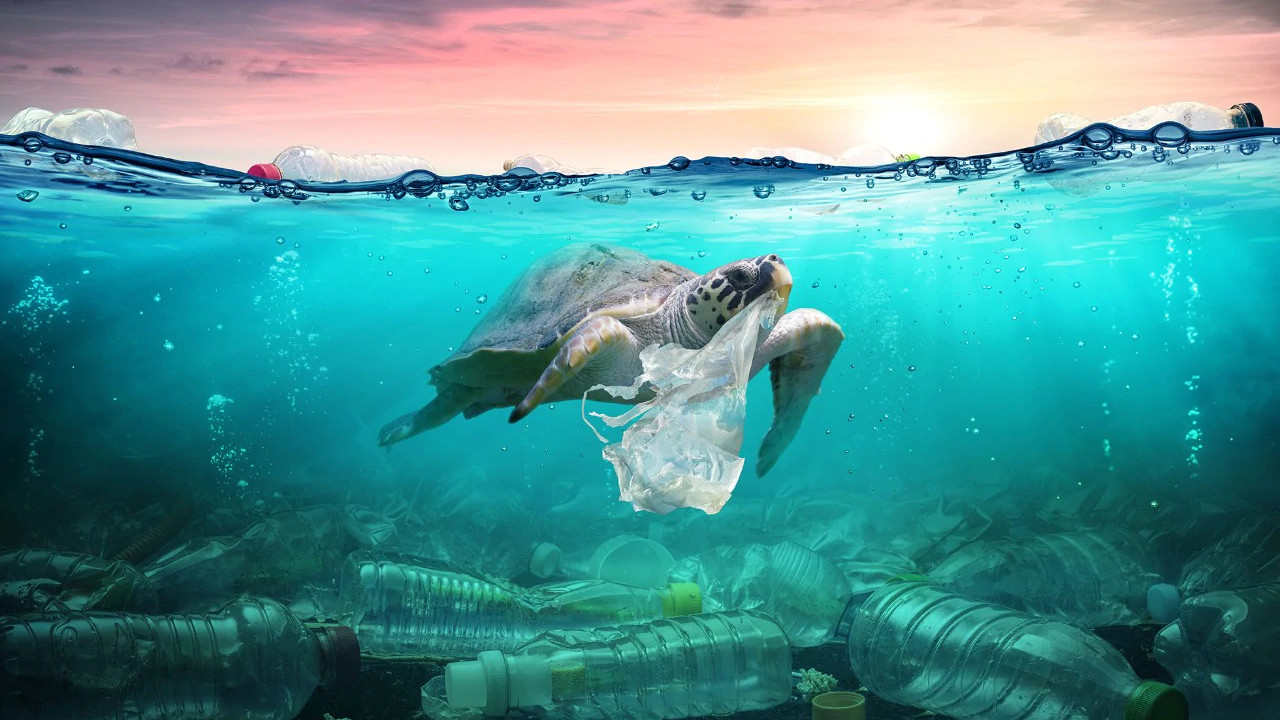Limiting the role of plastic in your life is a good goal to have. It will reduce exposure to the many toxins in plastic that pose a risk to human health, such as bisphenol A, styrene, lead, and phthalates, and you will have less plastic waste to send to landfill or recycling.
Avoid the worst plastic offenders
If you check the bottom of any plastic container, you'll see a number (1 through 7) inside a triangle made of arrows. The worst plastics are:
#3 – Polyvinyl Chloride, an extremely toxic plastic that contains dangerous additives such as lead and phthalates and is used in plastic wrap, some squeeze bottles, peanut butter jars, and children's toys
#6 – Polystyrene, which contains styrene, a toxin for the brain and nervous system, and is used in Styrofoam, disposable dishes, take-out containers, plastic cutlery
#7 – Polycarbonate/Other category, which contains bisphenol A and is found in most metal food can liners, clear plastic sippy cups, sport drink bottles, juice and ketchup containers
Use non-plastic containers
Carry a reusable water bottle and travel mug wherever you go. Pack your lunch in glass (Mason jars are wonderfully versatile), stainless steel, stacking metal tiffins, cloth sandwich bags, a wooden Bento box, etc. Take reusables to the supermarket, farmers' market, or wherever you're shopping, and have them weighed before filling.
Say NO to plastic straws! Use glass or metal reusable straws
Straws are a terrible offender when it comes to plastic waste. Heather Itzla of the blog There Is No Away writes that 500 million plastic straws are thrown away daily in the United States – enough to fill 127 school buses every day.
If you can't kick the straw habit entirely, then buy some reusable ones (glass, stainless steel, or paper) and keep them in your bag, car, and home. Some companies making good reusable straws are: Aardvark (paper), Simply Straws (borosilicate glass), VEHHE Metal Straws (stainless steel).

Eat an ice cream cone
Avoid the Styrofoam cups and plastic spoons that come with individual servings, as well as plastic-lined tubs from the store. Choose a cone instead, since edible is the ultimate form of green packaging! Or get an ice cream maker for use at home. It will be better-quality ice cream, anyways. In the same vein, get a stainless steel popsicle mold for your kids, instead of a plastic one.
Stop chewing gum
Gum is essentially the same as chewing on plastic. Ever since World War II, food scientists have stopped using natural rubber in chewing gum and replaced with synthetic rubber, which is also known as polyethylene and polyvinyl acetate. These substances are considered toxic and are known to cause tumor growth in lab rats, but due to industry pressure, have not been banned.
Think, too, about where old chewing gum ends up when you're done with it. It doesn't biodegrade.
Stop buying juice, soda, and other beverages that come in plastic bottles
In some places it's possible to buy soda in individual-sized reusable glass bottles that are returned for a refund. Go for that option whenever possible. Beth Terry of My Plastic-Free Life suggests getting a soda maker for use at home whenever you get a fizzy craving; the machine itself is plastic, but the carafes are glass and will replace hundreds of disposable bottles.
As for juice, buy it in concentrate form, which comes in a cardboard tube with metal ends and is much cheaper. Better yet, you could eat fresh fruit instead and eliminate all that additional sugar from your diet.
Use bar soap instead of liquid
Bar soap is cheap, often package-free, and just as effective as liquid soap. I like the bars made by The Soap Works in Toronto, and buy them loose at my local health food store.

Use glass or metal in the freezer
You don't need plastic in order to use the freezer. Glass jars work well if you fill only 2/3 of the way and avoid any thermal shock. Jars are good for stock, tomato sauce, coconut milk, etc. The only problem is you have to plan ahead and let them thaw slowly. Stainless steel is another great option. I've purchased some excellent sealable containers from Life Without Plastic that work very well in the freezer. An old-fashioned metal ice-cube tray is good, too. Buy meat wrapped in butcher paper.
One cheater solution I occasionally use is to buy or pick fruits and vegetables in bulk, and then freeze them in old plastic bags that I reuse until they reach end of life. It's not the best option, but it works in a pinch.
Choose toilet paper that's not wrapped in plastic
You can buy toilet paper in bulk at office supply stores like Staples. It comes in large cardboard boxes, without the thin plastic bag. You'll have a lot on hand, but buying in bulk is always a good idea to reduce packaging.
Use reusable menstrual products
On average, a woman will use up to 16,800 disposable menstrual products over the course of her life. Reusable options are just as good, although they take some getting used to and a bit of extra maintenance. Check out products such as Talisi Menstrual Cups and think ECO organic reusable cotton menstrual pads.
Related: Everything you need to know about menstrual cups, your vegana's new favorite accessory
Make your own yogurt
Yogurt is really quite easy to make; you can buy a yogurt maker (the actual machine is plastic, but the cups are glass and indefinitely reusable), or learn how to do it in a large Mason jar.

Use your compost bin
By composting all organic scraps, you can cut down considerably on the amount of garbage that you put out for collection each week. By separating it from regular household garbage, the latter will be drier, which limits the need for heavy plastic garbage bags. You'll also have rich soil in the composter, instead of buying potting soil in plastic bags for houseplants and gardens.
Margaret Badore has written about how to compost even in a small urban apartment.
Never drink bottled water
Buying bottled water in North America is absurd, especially when you consider that bottled water is less regulated than tap water; it's usually just filtered tap water; it's exorbitantly expensive; it's a gross waste of resources to collect, bottle, and ship it; and it results in unnecessary plastic waste that's usually not recycled.
Shop in bulk
The more items you can buy in bulk, the more you'll save in packaging. While this mentality has been the norm for years at special bulk food stores, it's fortunately becoming more common in supermarkets. You'll save money in food costs and, if you drive, in the gas used for extra trips to the store.
Search for items such as large wheels of cheese, without any plastic packaging, and stock up on those whenever possible.
Avoid frozen convenience foods
Convenience foods are among the worst culprits for excessive packaging waste. Frozen foods come wrapped in plastic and packaged in cardboard, which is often lined with plastic, too. There's not any way around it; it's a shopping habit that will have to go if you're serious about ditching plastic.
Avoid non-stick cookware
Don't expose yourself and your family to toxic perfluorochemicals that are released when non-stick surfaces such as Teflon are heated. Replace with cast iron (which works just as well as non-stick if seasoned and cared for properly), stainless steel, or copper cookware.
Make your own condiments
This could be a fun experiment in canning, and if you dedicate a whole day to it, you could have enough to last the whole year. Make cucumber or zucchini relish and ketchup when late-summer vegetables are at their peak. Items such as chocolate sauce, mustard, and mayonnaise are quick and simple to make once you get the hang of them. Everything can be kept in glass jars.
Let baking soda and vinegar become your new best friends
Baking soda, which comes for cheap in large cardboard boxes, and vinegar, which comes in large glass jars, can be used to clean, scour, and disinfect the house and wash dishes, replacing plastic cleaning bottles; soda can be turned into an effective homemade deodorant; and both soda and vinegar (apple cider, specifically) can replace shampoo and conditioner bottles. (Read about how I haven't used shampoo for 18 months.)
Use natural cloths instead of plastic scrubbers
If you need something with scrubbing power, go for copper instead of plastic. Use a cotton dishcloth or a coconut coir brush for dishes, instead of a plastic scrub brush. Use cotton facecloths instead of disposable wipes. Don't underestimate the versatility of old rags!
Keep your laundry routine plastic-free
Use soap flakes, soap strips, or soap nuts instead of conventional laundry detergents that come in plastic-lined cardboard with plastic scoops or thick plastic jugs. They are truly awful for the planet.
Along the same lines, use bar soap instead of liquid hand soap. Bar soap works as a good shaving cream alternative, too.
 CRIME Shirt $21.68 |
 |
 CRIME Shirt $21.68 |

